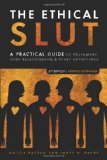I am leading a read-through of The Ethical Slut, 2nd edition. If you’d like to catch up on past installments, check the list at the bottom of the series introduction. Comments on the topics in this discussion are welcome anytime, even from people who aren’t following along in the book.
In this installment we discuss, Chapter 8, “Slut Skills”

This chapter of The Ethical Slut is about a number of skills which the authors feel are essential to happy and successful open relationships. It’s very similar to the chapter with the same name in the first edition.
The list of skills in this chapter is a good one. I’ve noticed that over the years I discover more about the behaviors, attitudes, and relationship styles I dislike or just plain can’t deal with. I’d go so far as to say that not only are the skills listed here important to good poly relationships, but for me they are absolutely essential and deal breakers when they are absent. I think sometimes people going into alternative lifestyles settle too easily, because they feel like their options are more limited. Perhaps this is literally true, and I’m sure more so depending on where one lives, but for me I have found that the abundance which Easton & Hardy write so much about seems to come more readily when one is choosy.
This chapter comes with an excellent warning which echoes some of my own recent writing. I think it bears repeating here:
“Alas, many people begin to explore open relationships because their partner is pushing them into it, or because all their friends are doing it and they don’t want to seem prudish. We ask that you get clear within yourself that you’re doing this for you — because it excites you, because it offers opportunities for learning and growth and fun, because you want to.” -from The Ethical Slut
Since it seems like as good an approach as any other, I’m going to go through each of the skills from this chapter in turn and give my thoughts on each one.
Communication: Obviously this first skill is a pretty big umbrella that encompasses much of the others and a lot of the rest of the book too. But of course the reason poly folk keep harping on communication is because it really is the most essential skill at the heart of our relationships. If you’re chronically avoidant of clear, direct discussions even when they deal with painful topics then do us all a favor and take a break from polyamory — or probably romantic and sexual relationships altogether — until you work on yourself a little more and figure out why it’s so hard for you to be open with others about what’s going on inside.
This section doesn’t list a lot of specific skills, though the one they mention — listening and repeating the other party’s words before adding your own — is a solid one. Some other ones that I think are worth adding to your repertoire are knowing when to take breaks and return to the discussion after you’ve cooled off, and also making sure you have shared definitions for the terms under discussion. Very often people mean different things when they say a word (polyamory itself is a particularly thorny example) and some conflicts can be solved just by understanding each other’s definitions of the subject at hand.
The authors mention that the book’s resource guide offers some option for those interested in learning to communicate better. I’ve already mentioned it here, but it bears repeating: my friends Pace & Kyeli wrote a great book called The Usual Error about communication. They actually quote me a lot in it. I noticed the other day that you can actually read the text in its entirety for free online, so I knew I had to link to it here.
Emotional Honesty & Telling the Truth: These two skills come close together. Easton & Hardy point out that unless you are honest with yourself and others, you can’t expect to get your needs met. Being honest with yourself is the first step — we have to be willing to admit when something makes us feel jealous, scared or unhappy. Sometimes it can feel harder for me, because I catch myself thinking that because I’ve been poly so long I shouldn’t feel “this way” (whatever negative emotion I am feeling in the moment). The truth is that none of us gets to be perfect “poly superheroes.” We can only be the best poly humans we are able to be, and that means admitting when we have feelings that are messy.

Knowing Yourself: This one is closely related to the other two above. One of the reasons I feel like I can really trust my current lovers is I know they’ll tell me when something is wrong, when they are upset or need something from me. They expect the same as well. However, none of us can be honest unless we take the time to analyze our feelings, to understand ourselves and spend time on personal growth. Nowadays, the people I want most entangled and involved in my life are the ones who’ve already spent time the time on themselves, who are already mature, whole humans that I can grow with rather than need to rescue or fix.
The kind of self-examination necessary to get to that point is scary, but it always makes a person better in the long run. These days I’ve become suspicious of the people who seem like they’ve “always” had it together and are perfectly sane. I would much rather be with someone who has faced their inner demons, acknoweldged that they exist and understands how to handle them.
Affection: There are different ways to show affection and different people appreciate some more than others. It’s good to find out how the people you love show and appreciate affection. I think a lot of kinksters are familiar with the idea of aftercare — the concept of giving a submissive or bottom cuddles, warmth, verbal praise and reassurance, water, food, etc. after a scene. It may sometimes seem like the submissive is the center of a D/s relationship in a weird way (you often hear this mentioned to outsiders, for example) but in a healthy relationship of any kind it’s always a two way street — both members need to feel loved in whatever ways make them feel special.
This entry is getting long already and I’ve only touched on half of the 10 skills introduced in this chapter. Rather than overwhelm anyone I am going to stop here for today. I’ll post the second part of Chapter 8, on Saturday, February 18, 2011.
In the meantime, we can start a discussion in the comments — where have you used these slut skills? What helped you discover yourself? Do you sometimes struggle with trying to be a poly superhero?
Kit O’Connell’s short story, “Lifting The Veil” will be published March 1 in This Is The Way The World Ends, a collection of apocalyptic erotica from Freaky Fountain Press.
“Lifting the Veil” is a story of sex, experimental drugs, and the end of the world. The anthology will be available in both print on demand and ebook formats. Click here for more information and to learn how you could win a free copy of the ebook.
